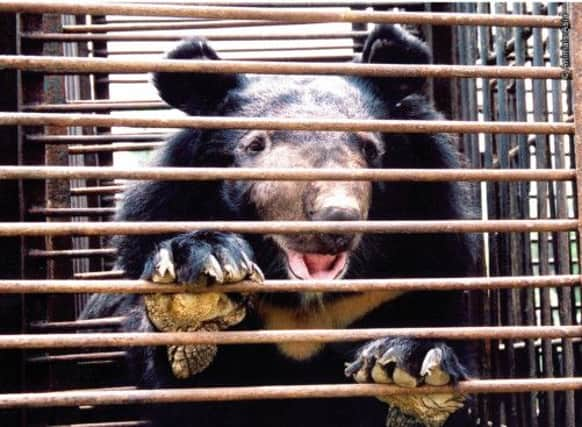Medicine trade condemns bears to a life in pain


In some farms, bile is extracted up to three times a day through this painful open wound from the thousands of bears that are the bedrock of an industry that produces “medicines” for human consumption.
This is the reality of bear bile farming, mainly in China but also in several countries throughout the Far East such as Vietnam, Laos, Myanmar and North Korea.
Advertisement
Hide AdAdvertisement
Hide AdBear bile is a digestive fluid produced in an animal’s liver and stored in the gall bladder. It is a key ingredient used in traditional remedies said to shrink gallstones, reduce fevers and improve eyesight. The bile is also marketed as an elixir for hangovers and a cure for hepatitis, with some of China’s leading pharmaceutical companies involved in the trade.
However, animal rights groups hope that by shining a light on some of the products made by these companies – many of which want to expand their businesses in western countries – they will help to bring the trade to an end.
Animals Asia has called for a timetable for bear farming to be phased out. The charity said: “A phased timetable is preferable to an overnight ban, as the welfare of thousands of bears hangs in the balance. The public opposition to bear farming is so great that we’re hopeful that we’re closer to meeting this goal than ever before.”
Bear bile farming has grown significantly in China since it was introduced during the 1980s. Previously, bile was taken from animals caught in the wild, but China’s dwindling number of bears forced a change of policy and authorities decided to cage bears and milk them in an attempt to protect the wild population. Chinese officials later pledged to reduce the number of captive bears from 7,000 to 1,500, but today there are an estimated 20,000 caged bears on nearly 100 domestic farms across China. The animals are mostly Asiatic black bears, better known as the moon bear because of a white crescent marking on the chest.
Ahead of a business event in Edinburgh tomorrow to be attended by ten Chinese pharmaceutical companies, Scotland on Sunday asked Animals Asia to check whether any of the firms used bear bile in their products. Animals Asia said China Beijing Tong Ren Tang uses bear bile in four products: Lv’E Oral Bolus, Club Oral Bolus, Bai Jing Yu Eye powder and an ointment.
The charity said the information was obtained from the China Food & Drug Administration, and a medical website called Ding Xiang Yuan confirmed that these products contain bear bile.
Founded in 1969, China Beijing Tong Ren Tang Group (TRT) has a history going back 340 years.
A statement on its website says: “Since the first year of the reign of Emperor Yongzheng in Qing Dynasty, TRT has supplied medicines to the imperial families, serving eight emperors in 188 years. The staff have stuck to the motto of ‘Regardless how difficult it was to get quality medical materials, no matter how complicated it was to produce medicine, neither funds nor strenuous work was spared.’”
Advertisement
Hide AdAdvertisement
Hide AdTRT became state-owned in 1992 and has 84 pharmacies in 16 countries. The company wants to open pharmacies in the UK and mainland Europe.
Scotland on Sunday telephoned and e-mailed the company but received no response to requests for comment.
Animal rights groups are now garnering greater public support, mainly from a burgeoning middle class in China which increasingly opposes animal cruelty.
Earlier this year, bear farms made national headlines when a Chinese company called Guizhentang Pharmaceutical submitted an application to the Shenzhen stock exchange to triple its stock of captive bears from 400 to 1,200 to expand production. But the company’s move backfired after protests led by Animals Asia prompted a public outcry. Pharmacies were picketed by protesters wearing bear suits and Guizhentang’s website was targeted by hackers.
In April, after Chinese media broadcast disturbing footage of bears in cages so small the animals could hardly move, Guizhentang withdrew its application.
It was a startling victory for Animals Asia, which cares for 158 rescue bears at a sanctuary in Chengdu. Bears often arrive emaciated with infections and tumours on their abdomens, which the charity claims are due to the extraction process for bile.
Campaigners said some rescued bears are so traumatised after years of pain and confinement they bang their heads against walls and chew on their own limbs.
However, the Chinese government does not appear to be willing to end the lucrative trade. A kilo of bear bile, for example, can sell for as much as £16,000. Although scientists have produced a synthetic alternative, traditionalists claim it does not work as effectively.
Advertisement
Hide AdAdvertisement
Hide AdDownton Abbey actress Lesley Nicol recently travelled to China to see the charity’s work. “The staff don’t push them to go out,” she said. “It’s like agoraphobia – space is terrifying.
“They learn how to put one paw in front of the other; muscles have atrophied through lack of use and many need arthritis medication.
“Recently, one bear took his first steps on grass. He kept sniffing the air and looking at the sky. They’ve never seen the sky.”